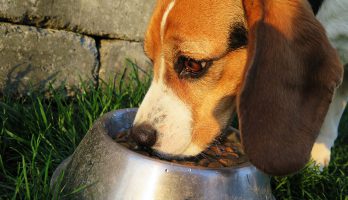Processed Food
Processed dog food developed by canine nutritionists is available in a variety of forms, such as wet food (canned food), dry food (kibble) and semi-wet food. It contains all the nutrients necessary for a dog’s good health so there’s no need to add vitamins, minerals or any other supplements.
Excellent value for money (as cheaper in terms of daily costs), these foods are also appetizing for the animal.
Processed food comes in two nutritional grades, “standard” or “premium” quality. Standard food offers, as previously stated, an adequate supply of nutrients but the quality and origin of the ingredients are not guaranteed. Premium food is made from superior ingredients, both in terms of their nutritional value and digestibility. Protein levels in premium food are high.
Wet foods – in boxes
Wet food containing 70 to 80% moisture is available in boxes. Quick to prepare, it gives the dog all the nutrients it requires (protein, carbohydrates, and lipids) and in the necessary quantities. In red meat or poultry varieties, wet food can be eaten on its own or mixed with cereals or vegetables. Once opened, the contents must be kept chilled and eaten within 24-hours. Unopened boxes can be stored for between 3 to 4 years.
Dry food
Dry food in the form of kibble comes designed to be eaten as it is or as a flaked cereal to be rehydrated with liquid (water or broth) or as dehydrated vegetables. All varieties come in cardboard boxes or bags of 3, 5 or 10kg (or more, depending on the brand). The calorific intake of kibble (weight for weight) is three times that of wet food.
Semi-moist food
Semi-moist food in kibble form contains between 20 and 30% moisture. Packaged in sacks, bags or cardboard boxes it is eaten straight from the packet as it is. It needs to be kept cool and consumed quickly.
Cases of special dietary requirements
Manufacturers of processed food also produce specific types of food designed to support dogs at different periods of their life (puppy, adult, during gestation, old age…).
There are also special dietetic foods, required for either short periods of illness or for the animal’s life in the case of certain chronic ailments such as canine diabetes, cardiac problems or renal insufficiency…
Traditional Food
Also referred to as household food, this food is prepared in the home and made up of kitchen or table scraps. This form of feeding is unbalanced and not at all advised for a dog’s continued good health. It either does not cover a dog’s nutritional requirements for minerals, trace elements, vitamins or fatty acids or, alternatively, can lead to an overdose of some or all of those elements.





